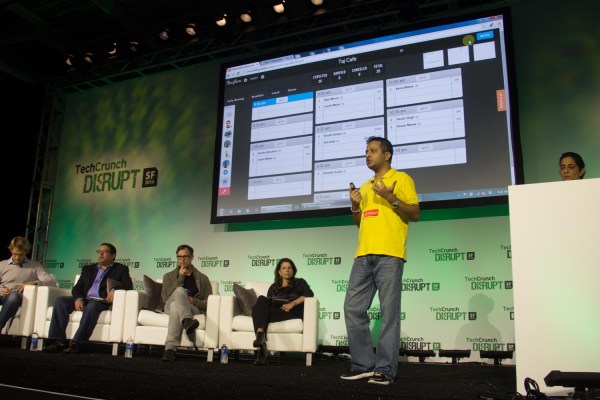TableGrabber aims to help restaurants fill their empty seats, and to that end, it’s launching a new platform today called RezGuru at the Disrupt SF startup battlefield.
The goal, as laid out by co-founders (and siblings) Sonia and Pawan Marwaha, is to adjust things like pricing and reservation availability in a way that maximizes revenue. For example, a restaurant might be so crowded that it’s turning people away between 8 and 10 pm, but it’s half-empty at 6 — so wouldn’t it make sense to encourage people to show up earlier, and maybe offer them better deals if they do?
Pawan (who’s also the company’s “chief grabber”) and Sonia gave me a quick tour of the RezGuru dashboard, which highlights things like a restaurant’s current revenue, as well as revenue averaged out across each available seat per hour. Restaurants identify the numbers that they want to maximize, then RezGuru will create pricing strategies for different times of day to make that happen, complete with detailed predictions about how performance will change.
Sonia told me that RezGuru makes those forecasts based on 21 different data points. Some of the data comes from the restaurants themselves (RezGuru can integrate with their point-of-sale systems), while some of it is external, including things like upcoming events and weather.
[gallery ids="1053633,1053634,1053635,1053636"]
And while the forecasting is RezGuru’s main selling point, TableGrabber actually offers a full content management system, so it can use a restaurant’s photos and digitized menu to create a presence on the web, on mobile, and on services like Seamless and GrubHub. (In India, Brazil, and Chile, where there isn’t a big player in online reservations, TableGrabber runs its own reservation and deal website.) Then it dynamically updates each of those channels to reflect the broader strategy.
There’s less flexibility in physical restaurants, which most likely have printed menus, but Pawan said that even there, restaurants can add special deals and create more customized menus (lunch versus dinner, weekday versus weekend, etc.).
Not only can a restaurant use RezGuru to fill seats, but it can also avoid waste. If they’ve got steaks that will go bad in a few days, they don’t have to frantically try to get rid of them on the final day, because RezGuru can project the likely consumption and recommend whether prices need to be lowered to sell the steaks off more rapidly.
It’s not just about pricing, either. Pawan said that RezGuru can also recommend strategies like splitting four-seat tables into two tables for two people each (if most of the demand comes from couples), or closing an hour early (because late customers aren’t bringing in enough money to justify staying open).
I don’t know much about the restaurant business, but I was struck by a recent Priceonomics blog post about how restaurants are extremely sensitive to alienating their regular customers. So I wondered if RezGuru customers run that risk if they adopt this kind of dynamic pricing. Pawan pointed out that generally speaking, customers won’t pay more than the standard menu price — what they’re going to see are the discounts and deals.
“On the other side, when I’m sitting in an empty restaurant and still have to pay full price, I feel cheated,” Sonia added.
In addition to launching RezGuru for U.S. restaurants today, TableGrabber (which was founded in New Delhi) is opening an office in Palo Alto.
Q&A With Judges
Q: Isn’t there a big incumbent in the space?
A: OpenTable is just a reservation system, not a forecasting system like us.
Q: I don’t like the idea of paying more during peak hours.
A: Yeah, we’re used to doing that in an airline or hotel, but not in restaurants. We don’t encourage restaurants to raise prices, but during peak hours they can set a few tables aside for people who commit to spending a minimum amount.
Q: If a restaurant wants to offer a deal, how do you make them aware of that?
A: We’re not in the business-to-consumer market, but we have open APIs to update other services.
Q: Are you relying entirely on third-party apps for promoting deals?
A: We created our own consumer platform, TableGrabber, in other countries, but in the US we wanted to pick our battles.
